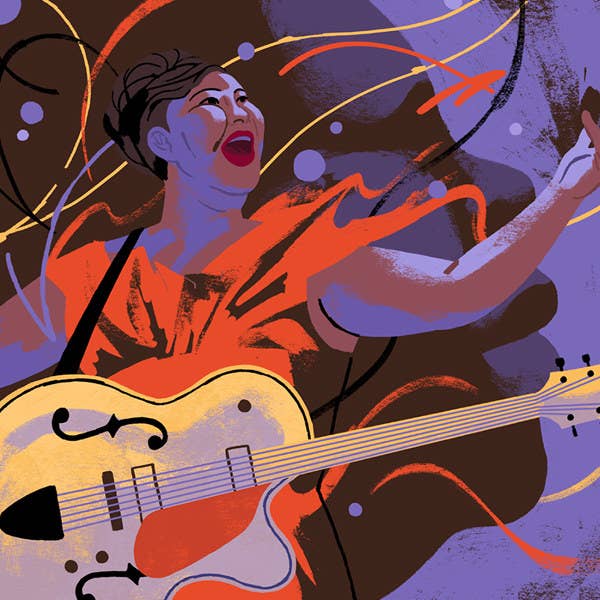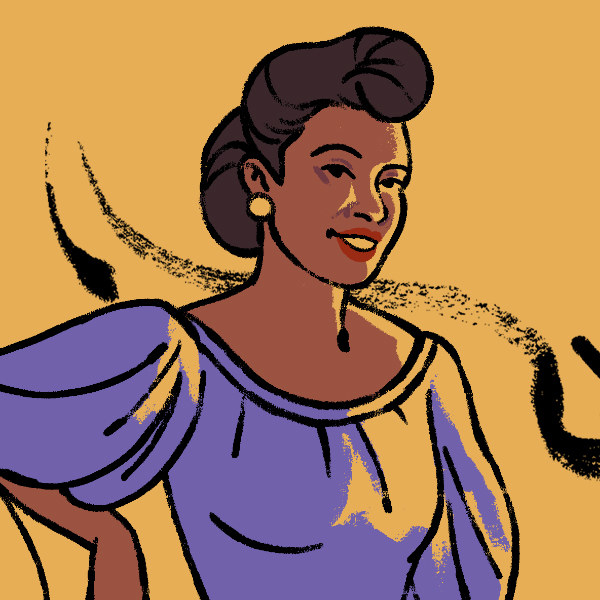There are some pieces of history that unfortunately fall through the cracks of time, but we can't let them go unnoticed. That's where we come in. In this series, you’re going to be learning about underrated people, movements, and places that need to be talked about more. Introducing: Your Mini Dose of Underrated History.

A Black, queer woman named Sister Rosetta Tharpe was the godmother of rock 'n' roll. If you've heard her name before, then you're already familiar with this overlooked trailblazer, but if you're like me and believed the groundwork of rock 'n' roll was laid out by mega-famous* people like Elvis, then buckle up because you're about to get a mini history of a true legend.

Rosetta Nubin hails from Arkansas, where she was born in 1915. She first started learning guitar at the age of 4.* At the age of 6 — yes, you read that right — she was traveling around the South performing in churches with her mother in an evangelist troupe. We can only assume this is where her love for performing and music grew, which helped launch her into stardom years later.

Rosetta and her mother eventually moved to Chicago, where she continued to play around with her style of music, mixing elements of jazz and gospel with her unique voice. Rosetta was NOT going to let anyone box her in! She was fully experimental. When she was 19, she married a preacher named Thomas Tharpe, but the marriage didn't last. Though their love wasn't forever, Rosetta did take something from her first husband. (Have you rendered a guess yet?) Yes — his surname.* Thus, the stage name Sister Rosetta Tharpe was born.

Female guitarists weren't widely accepted in the 1930s. (That's patriarchy and sexism, baby!) This is probably why Elvis is a household name* while Rosetta isn't, but I digress. Tharpe was arguably one of the first guitarists to use electric guitar distortion intentionally. A true innovator! And her range? Impeccable. Rosetta refused to be boxed in by her sound, making her a trailblazer in the music world. You can clearly hear her talent in her breakout hit, "Rock Me." By 1938, she was recording for Decca Records.

By 1938, Rosetta and her mother were living in New York City where, at 23, she joined the Cotton Club.* Rosetta's lyrics contained themes of love and sexuality, and within the next decade, her bisexuality was known within the industry — although it was still a secret to the general public. Enter: Marie Knight.

Rosetta saw Marie Knight performing at Golden Gate Auditorium, and as a result, a talented, exquisite relationship blossomed. Marie and Rosetta toured and went on to write "Up Above My Head" together. In the late ’40s, there were rumors of a romanic relationship between them, deemed “radical” for the time. However, Marie went on to deny the rumors. By 1950, the relationship ended and Rosetta married* her manager, Russell Morrison.

Why did America seemingly forget Rosetta? Well, the answer can be summarized in two words: fresh meat. The music industry moves quick, constantly on the lookout for new stars. It happens to this day. So, although Rosetta was deeply talented, bigger names emerged onto the music scene in the 1950s, including Cash and Presley.* But this wasn't the end for Rosetta. She flourished overseas, performing incredible shows all over Europe.

Sadly, Rosetta's health declined in 1970. One of her legs was amputated due to diabetes complications, and in 1973, she died of a stroke. But her legacy lives on. Though, in my opinion, this recognition took a while. In 2007, she was inducted into the Blues Hall of Fame, and in 2018, she was formally inducted into the Rock & Roll Hall of Fame.

Hopefully you've learned a little about why Sister Rosetta Tharpe was a pioneer of rock 'n' roll music as we know it. We absolutely cannot deny her influence on rock music that we know today. A true, talented legend.
Sources:
Forebears: Sister Rosetta Tharpe, The Godmother Of Rock 'N' Roll (from NPR)
She Can Make That Guitar Talk (from NPR)
Black History Month: Lesbian Sister Rosetta Tharpe was godmother of rock ‘n’ roll (from Q Voice News)
QUEER, BLACK & BLUE: SISTER ROSETTA THARPE IS MUVA OF THEM ALL (from Afro Punk)
Sister Rosetta Tharpe Inducted Into The Rock Hall Of Fame (from Rock Hall)
What Do You Mean You’ve Never Heard Of Sister Rosetta Tharpe? (from U Discover Music)
Sister Rosetta Tharpe: Singer influenced key rock ‘n’ roll figures (from AJC)
The Pioneer: 7 Things You Need To Know About Sister Rosetta Tharpe (from Essence)
'The Most Elaborate Wedding Ever Staged': Rosetta Tharpe At Griffith Stadium (from NPR)
Why We Keep Rediscovering Sister Rosetta Tharpe, the Flamboyant Grandmother of Rock (from Beacon Broadside)
